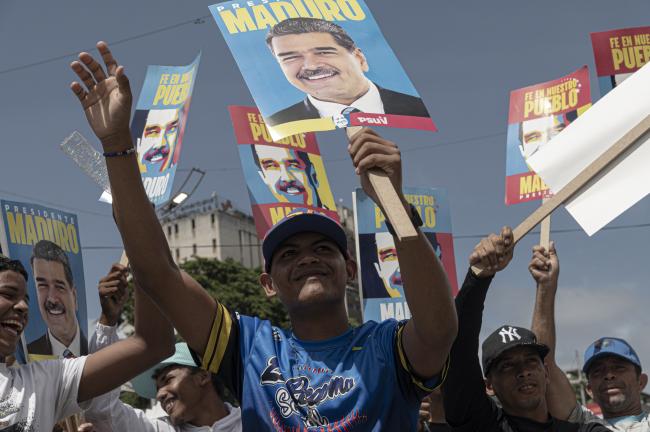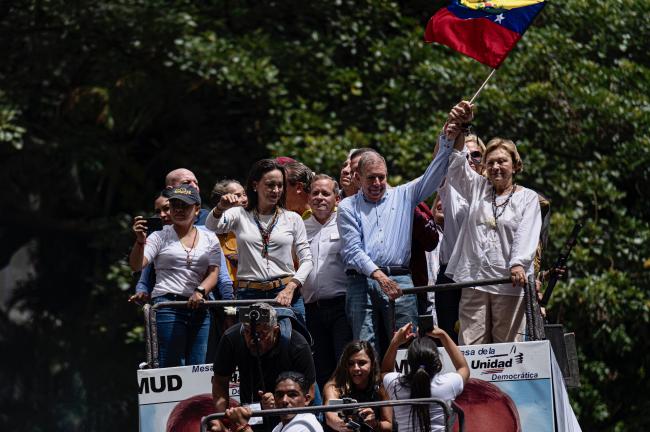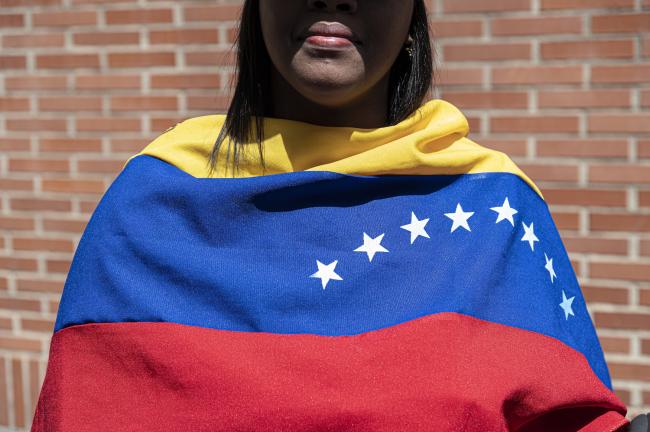
What has happened in Venezuela since voting concluded on Sunday represents a worst-case scenario for the heavily-anticipated elections.
It was already foreseen that it would be very difficult for the Venezuelan government, with all its accumulated military and institutional power and threatened by increased sanctions from the United States and Europe, to give up its mandate without guarantees. However, the resumption of negotiations at the beginning of July between Caracas and Washington and the progression of the presidential campaign without any serious incidents opened a halo of hope that the Venezuelan people could settle their conflicts in a democratic manner.
Since the 2013 presidential elections, in which the current President Nicolás Maduro won by a narrow margin, there have not been presidential elections in Venezuela in which all political actors participated. In 2018, the opposition called for abstention from the electoral process and only some marginal parties from its orbit were encouraged to participate, resulting in an abstention of 54 percent.
We are now faced with the worst scenario because the two main candidates, Maduro and Edmundo González Urrutia, are in their own way ignoring the electoral process and foreclosing avenues for a democratic resolution.
The National Electoral Council (CNE) offered partial results at midnight on Sunday, in which Maduro, with 80 percent of the ballots counted, was in the lead with 51.2 percent of the votes over his opponent González with 44.2 percent. This partial result was inconclusive as the outcome could shift given the number of votes still to be counted. But doubts jumped to paroxysm when, without publishing the electoral records and final tally as required by law and without the subsequent audits, the electoral body proclaimed Maduro president for six more years in an official event. This seemed like a suspiciously hasty act only 12 hours after the initial partial result was released.
Of course, the opposition immediately rejected the results issued, claiming that the tally transmitted and printed by the CNE, which it holds in its possession by legal mandate, contained other results.
The greatest weakness of the opposition's claim is that its rejection and automatic denial of adverse results is part of the Venezuelan political-electoral landscape. Not even at the height of Chavismo, when former President Hugo Chávez led the opposition by up to 20 points, the radical sectors of the opposition refused to accept and recognize the winner, decrying "wolf" on countless and baseless occasions. Furthermore, Juan Guaidó’s call for abstention in 2018 and the subsequent experience of his parallel government, which had no electoral foundation whatsoever, accompanies an accumulation of anti-democratic actions that detract from the integrity of the opposition’s current claim.
On this occasion however, for the first time, a more rational than usual opposition has published the vote count issued by the electoral body itself in each polling station, in which, apparently, its candidate González wins by a wide margin.
The strength of their evidence, which has not been denied by the government, is that the opposition is, it seems, showing the official minutes issued by the CNE itself. Their claim is not about some flaw in the process or the partiality of any authority. The electoral process as a whole has been recognized as legitimate by all national and international actors. We are dealing, then, with nothing more and nothing less than the final sum of the tally sheets that have already been officially printed, so the clamor is reduced to an official disclosure of the tally sheets so the numbers can be scrutinized and compared.
Has "the wolf" finally arrived?
Several of the other candidates, including Benjamín Rausseo and Antonio Ekarri, have also made the same request for the publication of the concrete results—not only the general results, which were only published partially, but also the precise results by state, municipality, and polling station as required by law in order to corroborate the tally sheets already in the hands of different actors who participated in the process. This demand is not limited to internal actors but also to international actors and observers.

International Pressure
Latin American countries are very protective of respect for the democratic process. Universal suffrage has been a historical struggle that has cost blood and sweat on the part of popular, leftist, and progressive sectors in the region. To endorse a triumph without the backing of electoral evidence means, therefore, putting at risk the very notion of democracy. This could encourage a triggering of para-electoral dynamics that, in turn, would be a gift to sectors of the radical right in the region that have historically opposed this constitutional right.
Perhaps for that reason, allies of the Venezuelan government, including the chancelleries of Mexico, Brasilia, and Bogotá, have asked for the publication of the electoral records as a way of verifying the veracity of the official results. This demand is invariable in the official and diplomatic speeches emanating from both the adversaries and allies of the ruling party in Caracas.
Mexican President Andrés Manuel López Obrador has criticized the Organization of American States (OAS) for its interventionism in the Venezuelan elections. However, he also said "we are going to wait for the result, and when the recount has been carried out, we will see what the legal process is, and then we will make a pronouncement.”
From Colombia, the government of Gustavo Petro, who has worked hard for the reinclusion of Venezuela in the international community and has been outspoken against sanctions, has also requested, through its foreign minister Luis Gilberto Murillo, "to know the tally of the final results and that these be audited by the world."
The president of Brazil, Luiz Inácio Lula da Silva, has issued a similar declaration: "when the final results are presented and confirmed to be true, we will all have the obligation to recognize Venezuela’s electoral results." Brazil had already vetoed the attendance of its ambassador to Maduro's proclamation ceremony, held less than 12 hours after the first partial result was disclosed.
Washington's prudence has been unprecedented given the aggressive manner the White House is accustomed to in its dealings with Caracas. A call between the U.S. President Joe Biden and Lula brought the U.S. position in line with that of the more moderate diplomacies in the region.
Of special importance are the positions of the Carter Center and the United Nations, since their participation in the electoral process was agreed upon in the Barbados agreements, signed by the government and the opposition in 2023. The former has already declared that "the Venezuelan presidential election of 2024 did not comply with international parameters and standards of electoral integrity and cannot be considered as democratic." This electoral verification entity has a symbolic significance as it was one of those who recognized the 1998 election in which Hugo Chávez won the presidency for the first time and defended the integrity of the result of that time against critical voices in the international community.
On his part, Stéphane Dujarric, a spokesperson for UN Secretary General Antonio Guterres, called for "the results of the elections and a breakdown by polling stations be published punctually."
The difference in the current moment, in relation to previous elections and in terms of diplomacy, is that different actors seem to be aligned around a very concrete demand that falls outside ideological parameters.

Violence returns to Venezuela
Protests were not long in coming. Once Maduro was proclaimed president in an act as solemn as it was hurried, crowds of discontented and indignant people took to the streets throughout the country. These demonstrations did not take place in opposition strongholds, as is usually the case. In this instance, the urbanized areas of the cities that are historically anti-Chavez have remained completely calm, as the opposition leadership asked people not to take to the streets.
The protests came from the working-class neighborhoods that for years have been the comfort zone of Chavismo and where, it seems, if the numbers published by the opposition are confirmed, the movement suffered an electoral meltdown on Sunday.
The mobilizations, many of which took place in a peaceful manner, also included looting, the burning of public institutions—such as the headquarters of several mayors' offices, and the vandalization of several statues, among them those of the former president and founder of Chavismo Hugo Chavez. The defense minister Vladimir Padrino has reported the death of one member of the National Guard and 48 officers wounded.
The government's response has been mainly by means of para-police forces that have clashed with protesters, often brandishing firearms and on occasions firing into the air to break up the demonstrations. Hundreds of people have been arrested and some media outlets have reported at least seven deaths.
Some calm was felt on Wednesday, after intense Chavista mobilizations taking place the day before, although the climate remains very tense.
As things stand, we are poised for an official result, whose tally has not yet been completed and which has not gone through the standard audits established by electoral law, and an unofficial result, published by the opposition on a website, which in theory would add up the tally sheets issued by the CNE itself and produces another result, one that gives a clear victory to Edmundo Gonzalez.
Which of the two positions is accurate? We will have to wait for the publication of the voting record by the CNE to find out—this is what all national and international political actors are demanding. The alternative is to stop any normalization of Venezuela's relations with the world and place the Caribbean country in a situation of prolonged instability.
Ociel Alí López is a sociologist and winner of the CLACS-SIDA award for young researchers and the Caracas municipal literature award. He is a professor at the Central University of Venezuela and writes about Latin America.

